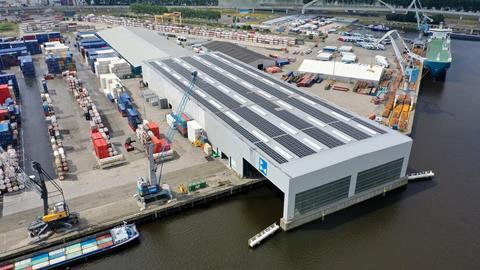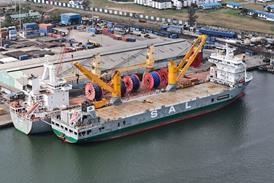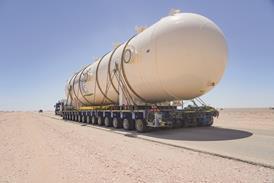Broekman Logistics has shared details of the steps it is taking to reduce fossil fuel use at its terminal operations in Rotterdam.

The organisation has set specific targets for its activities at the Dutch port for the next three years, focusing on its own processes – particularly on energy consumption and energy supply. “Energy is the essential backbone of our operational activities. It should be used as efficiently as possible,” explained sustainability manager Johan de Jong.
“By 2025, we want all sites to be equipped with LED lights. This should result in a 10 percent saving in energy consumption. However, we see that in some locations, where LED lighting has already been installed, the lights can sometimes be on continuously. By using sensors, we can further reduce energy consumption there.”
In addition to energy consumption, energy supply is being studied. That must be 100 percent sustainable within two years. In spring 2023, one of the service provider’s Rotterdam breakbulk terminals was fitted with no less than 2,700 solar panels for this purpose. “The energy we generate with this is equivalent to the energy consumption of 560 households and accounts for a third of the energy consumed at this site,” said Rob van Dijk, director of terminal operations at Broekman Logistics.
However, solar panels are not always the most obvious option, De Jong points out. “Technically, it is feasible to install panels on our hazardous goods warehouses as well. However, from a safety perspective, we prefer to look into buying truly green energy for those locations,” explains the sustainability manager.
Broekman Logistics is also investigating options to further reduce diesel consumption. It has already taken steps by switching to electric and LPG forklifts, as well as eco reachstackers that consume less fuel. Diesel consumption must be reduced by 10 percent by 2025. “That sounds easier than it is in practice, because you depend on other parties for that electrification,” noted Van Dijk. “After all, charging facilities must be created at the terminal.”
De Jong calls the sustainability efforts at own sites and for own processes the tip of the iceberg. “Most of the emissions are elsewhere in the chain,” he said. “We therefore also enter into dialogues with clients, suppliers and other stakeholders to see how we can make that chain more sustainable together.”
Among other things, Broekman Logistics participates in the Joint Corridors Off-Road programme, which encourages shippers and carriers to make more use of inland shipping, rail and shortsea. The programme has now saved 1.5 million truck journeys, amounting to a reduction in CO2 emissions in the chain of almost 900,000 tonnes.
De Jong added that a growing number of clients recognise the importance of sustainability and that its clients are increasingly asking for zero-emission or CO2-compensated transport. “Some even make concrete demands, expect us to facilitate a sustainable process and want to develop initiatives together with us, such as electrifying internal transport, or developing new packaging solutions in our warehouse processes,” he explained. Awareness is also growing among its own employees. Annually, the service provider prepares a sustainability report, evaluating business activities according to the internationally recognised GRI Sustainability Reporting Standards. He noted that employees are unlikely to read the report from cover to cover, and the “we inform and motivate our people among other things with short vlogs and blogs on our intranet.”
When it comes to facilitating the adoption of green technologies, De Jong said companies should be sure to delve into the various subsidy opportunities on offer, and that “the argument that a business case cannot be made to work, or that sustainability is too costly, often does not hold water”.
Van Dijk added: “It is important to make one person or preferably one team truly responsible for sustainability. If you don’t, you risk sustainability fading into the background and you will soon be too late. You also don’t have to invent the wheel yourself. There are now plenty of real-life examples. Therefore, look beyond the walls of your own company and learn from the successes and mishaps of others.
“Many companies and organisations are working on sustainability and are willing to cooperate. For example, we are currently looking together with the Port of Rotterdam Authority at the possibility of equipping one of our Rotterdam terminals with shore-based power, allowing ships to plug in during their visit instead of using their diesel generator.”
According to De Jong, it is only a matter of time before the company’s sustainability goal is achieved. “In time, our terminals will be completely fossil-free. That will be quite a challenge – especially technically – and there are certainly steps to be taken, but I am confident it is within reach.”
















